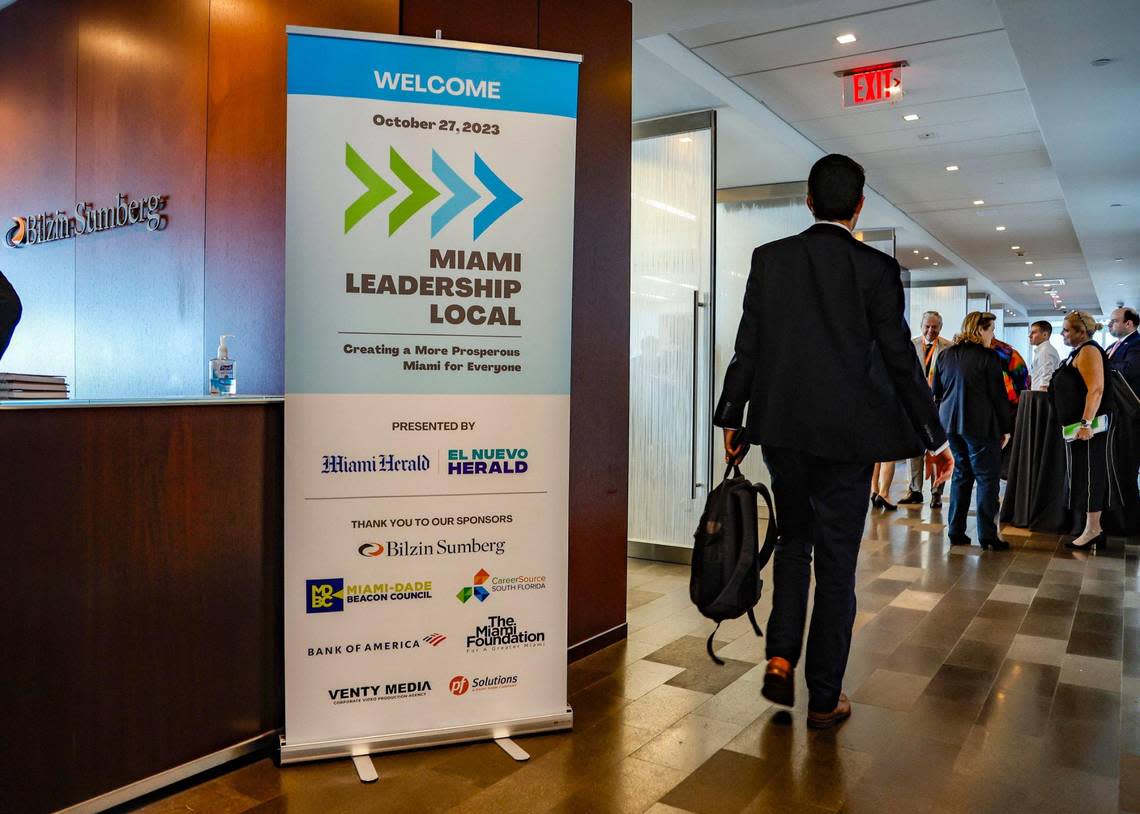Powerhouse Miami group’s big goal: Boost upward mobility for struggling workers
In Miami, famously, it’s now the best of times. Tech and finance firms are moving in. Unemployment is vanishingly low. Construction cranes fill the sky, and the ports are bursting to the seams with visitors and goods.
But for far too many Miamians, it’s also the worst of times. Metro Miami has one of the highest rates of economic inequality in the country, and the gap keeps growing. Poverty is up as wages lag and rents and home prices soar, so that even those fully employed can’t afford a place to live.
Call it the flip side of the boom, the economic paradox that has left a majority of Miami-Dade County residents struggling out of sight to survive even as a conspicuous minority enjoys fast-growing wealth and prosperity.
Now leading figures in local business, government and philanthropy have decided it’s also the most opportune time to do something about those seemingly intractable economic issues.
An ad hoc group has launched an initiative to put some of the county’s best minds to work devising answers to a daunting dilemma: how best to hoist long-struggling Miamians aboard the speeding train of opportunity propelled by the city’s growth and good fortune.
The volunteer initiative, Miami Leadership Local, launched last week at a standing-room only conference and workshop in a Brickell skyscraper, is meant to generate discussion and concrete ideas to boost economic mobility across the county — and to hold the participants to their promises.
Led by the Miami Herald in partnership with the Miami Foundation and the Miami-Dade Beacon Council, the endeavor will focus on several broad themes: fostering housing affordability, improving education and specialized training, and expanding badly needed support services to families like quality child care.
Its sponsors recognize the effort may sound Pollyannish, but they say they’re set on generating specific, practical proposals that can be put into action, all with one overriding goal: ensuring a more prosperous local economy for everyone, not just the relative few.
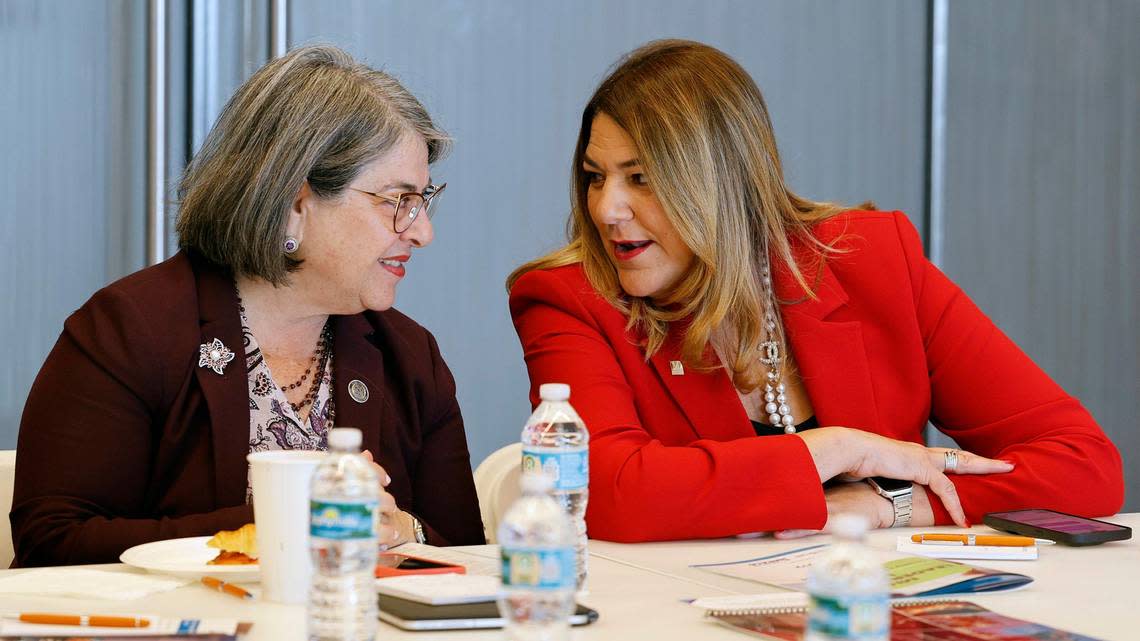
“This could be the day that could change everything for this community. We are starting from a good place,” Miami-Dade Mayor Daniella Levine Cava told participants. Though she did not organize the effort, she said she fully endorsed it.
“We’re in this moment when we have kind of a clash of opportunity and challenge. We have phenomenal wealth and energy and innovation happening, and benefiting many, but not all. Income divides are increasing. Lack of access to housing, the educational challenges are happening in the middle of what could be considered a renaissance. Everybody here is ready for this moment.
“We have the right people in the room.,” she said. “It’s just the beginning. We have the right issues. And we have the right approach. This is a collective action approach. I am expecting great ideas and commitments to emerge today.”
The ideas did emerge, if in early form.
Sponsors pledged that the meeting, held at the offices of host Bilzin Sumberg, a leading Miami law firm, would be only the first in a series. The idea is to eventually develop proposals that enjoy broad support and can be adopted and funded by businesses, public officials and civic and philanthropic groups.
Not all the concepts brought forth were new, and some in fact have been widely discussed before.
For instance, participants in a panel on housing affordability said one key to easing the crunch is zoning reform that would increase residential density and supply, especially near public transit — an effort Miami-Dade has been spearheading with some notable successes.
But experts on the panel urged even wider reform, especially in places that have historically used exclusionary zoning to block multifamily and affordable housing.
Participants in virtually all of the five panels on the day’s main topics stressed that leaders need to move more quickly and decisively if their effort is to succeed in helping to ease the housing crunch and begin to close the yawning wealth gap.
Among those at the opening session — people who don’t normally sit all together in one room — were veteran developer Armando Codina, Miami Design District mastermind Craig Robins, developer Terra Group’s CEO David Martin, Miami-Dade schools superintended Jose Dotres and leaders of the United Way Miami, the Children’s Trust, Miami Dade College, the YWCA South Florida and companies like Royal Caribbean and Miami IT security firm Kaseya, as well as host law firm Bilzin Sumberg.
Organizers promise public accountability. Group discussions and ideas are being documented on a website, www.miamileadershiplocal.com, so that members of the public can monitor and check that there is follow through.

At the opening session, Miami Foundation CEO Rebecca Fishman Lipsey said the guiding concept should be that of integrating those community members who are isolated by poverty, insufficient education or opportunity into the booming economy so they can see and take advantage of the benefits first-hand.
“When you research it, the number-one factor which enables upward mobility is actually not access to education, it is social mobility,” she said. “People living with low incomes who have access socially to real relationships with people in middle-income environments and a high-income environment, their upward mobility spikes.
“And we as a group of leaders have a lot of power to create those social on-ramps in the places that we lead, in the places that we work, in the places that we worship, the places that we play. It benefits everybody here that lives in Miami.”
But the hill to climb will be a steep one, according to a statistical overview delivered by Beacon Council CEO Rod Miller.
The council, the county’s economic development agency, last year supported creation of 5,700 new jobs with an average wage of $100,000, Miller said. But the importance is limited because, as he noted, “over half the population is really grappling with employment and living.”
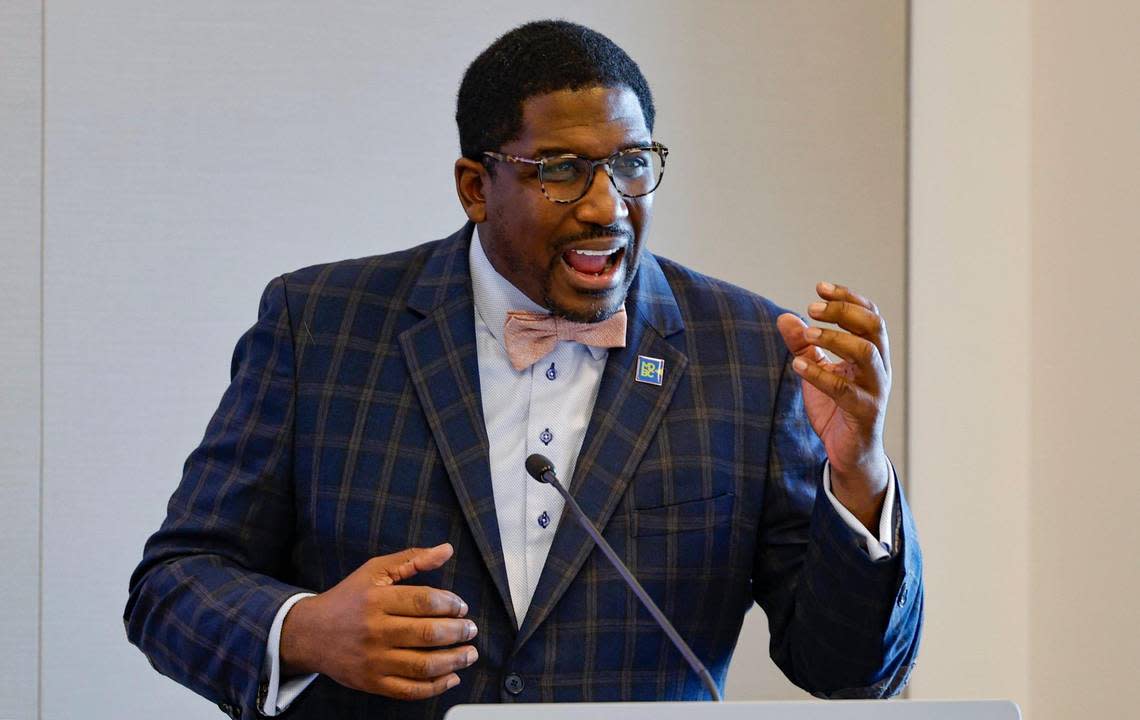
According to a Beacon Council report submitted to Miami Leadership Local:
▪ Just over half of Miami-Dade households are defined as working poor, with incomes insufficient to meet basic needs, or fall below the federal poverty level.
▪ More than a quarter of renters in the county are considered “cost-burdened” because they spend more than 40 percent of their income on rent alone.
▪ Miami-Dade’s tourism and hospitality industry contributes $11 billion annually to the local economy and accounts for more than a third of all jobs, but pay is low, less than $50,000 on average, and well below the median county income of $59,000.
▪ The number of higher-paying jobs in business, finance and computers is growing, but still accounts for only 10 percent of local employment.
“So what are the solutions?,” Miller asked. “Some food for thought: more housing supply, period. More density, more multi-family versus homes. We need more jobs and we need better jobs. Affordability becomes less of an issue if you have more money, right?
”So we’ve got significant challenges. These are challenges facing people all around the country. But I think we’re in a better position to handle these challenges. Why? Because of the moxie in Miami-Dade County.”
Several panels on key areas convened to brainstorm, debate and begin to develop proposals:
Rebuilding the affordable housing market
Participants in a housing affordability session stressed the need to substantially increase the supply of housing and the speed of delivery, with a particular focus on development of homes and apartments at a lower cost that a greater proportion of local residents can afford.
One approach endorsed around the room was zoning reform to increase density, including in “buffer zones” around existing single-family neighborhoods, and to allow smaller and thus less expensive apartments. Participants also called for drastic reductions in required but costly, space-consuming parking at residential projects, with development of shared neighborhood garages to take up the slack. That would also allow for many more apartments in low-rise buildings that are less expensive to build.
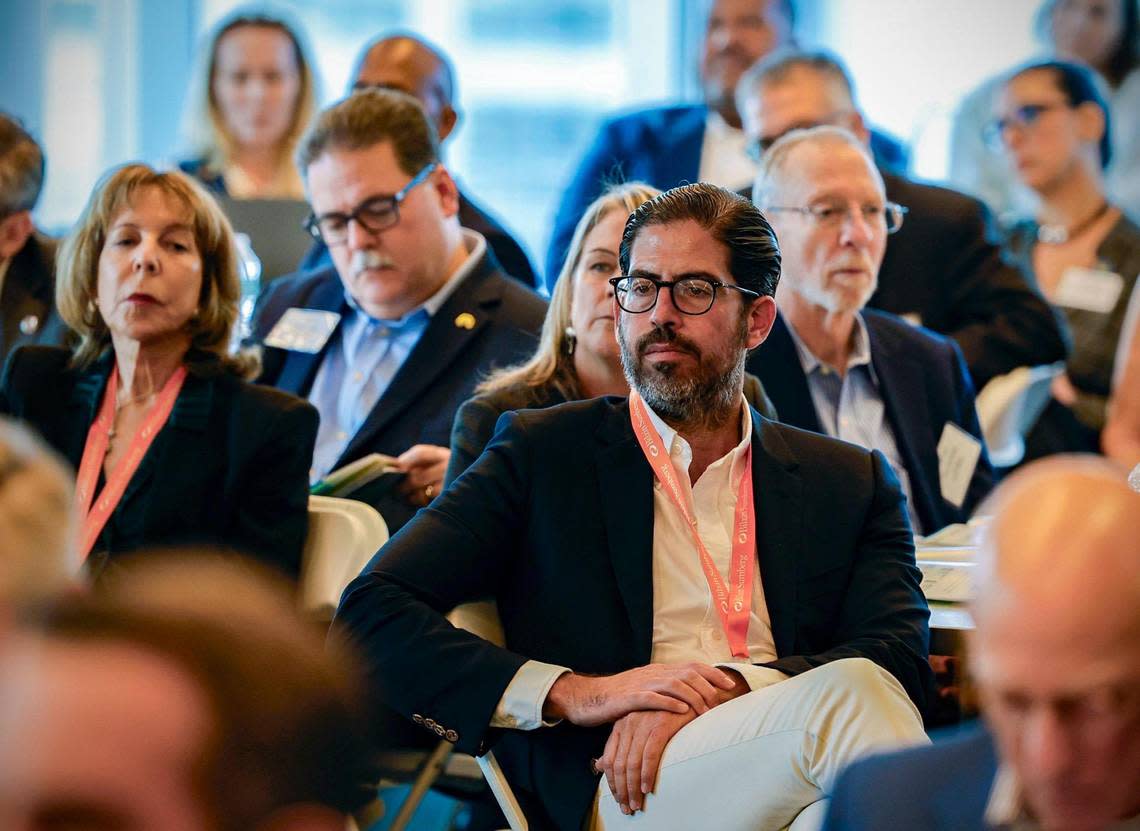
Robins, CEO of Dacra, warned against putting affordable housing only in poor neighborhoods. Public incentives should encourage affordable housing across the breadth of the county instead, with a specific target in transitional or gentrifying areas to keep existing residents in place and avoid displacement.
And new housing should incorporate a range of incomes instead of concentrating poverty as was done in decades past, warned Albert Milo Jr., president of Related Urban, the giant development group’s affordable housing arm.
But high and rising land prices remain a formidable obstacle, participants agreed. Reduced parking and other shared resources can help control costs, but Milo and others urged taking stock of underused public land, including under-attended schools, for possible hybrid projects that would address both housing and educational needs. The approach could include both new state-of-the art school buildings combined with housing to “reimagine” public school campuses, Milo said.
In Brickell, for instance, Related Urban is building a new Miami-Dade public school next to a mixed-income residential building, Milo said.
“If we don’t Look at all public assets and reimagine them, then you’re never even going to have a chance to tackle this problem. Without the land, there is no way to tackle the problem,” he said.
G. Scott Hansel, CEO of the Chapman Partnership, which runs publicly funded shelters and programs for the homeless, suggested also creating a fund to buy and renovate existing, smaller apartment buildings that can provide affordable rents, often at a lower cost than building new.
But all of the above will cost money, and public funding must increase, said Annie Lord, executive director of Miami Homes for All, a housing advocacy organization.
“We have to pay for the supply that we need. We can’t get around the idea that we have to pay for it, even as we seek to lower costs,” she said. “We are still an economy that is driven by the service industry. We’re going to have to make sure our workforce can live here.”
Robins concluded the effort will require hiring an expert to compile data and research and outline solutions — and he offered to contribute $25,000 to a fund to get that going.
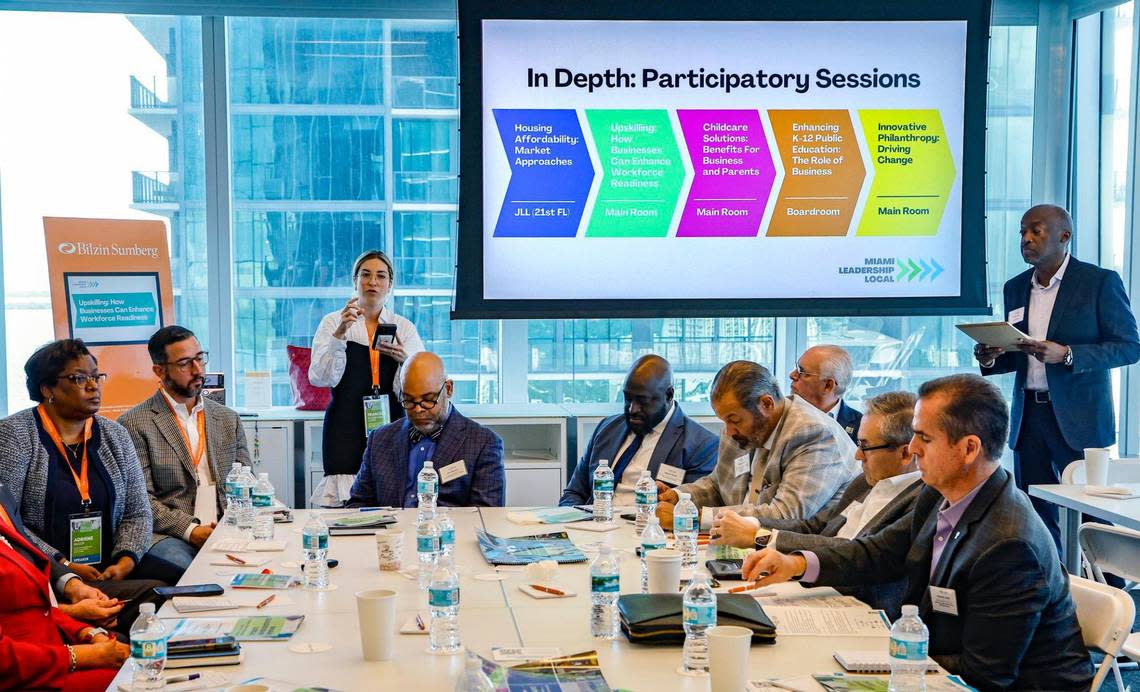
‘Upskilling’ a key to worker training, income
A session on “upskilling,” or the need for businesses to enhance training and qualifications for workers without college degrees, focused in part on some innovative programs that could be replicated and expanded.
Participants said it’s often too difficult or unaffordable for people already working to find ways to upgrade their skills and education to move up the career ladder to higher-paying jobs.
At United Way, a new $2.5 million program is assisting low-income, underserved Miami-Dade County residents with job training and career development skills in healthcare, transportation and other industries.
Baptist Health, Miami-Dade’s largest private employer, used to provide tuition reimbursement only to workers, but many could not make use of that, said senior vice president Adriene McCoy. So the nonprofit hospital chain and healthcare provider now provides money upfront for tuition assistance and certification programs leading to clinical jobs that can pay six-figure salaries, she said.
At the same time, said MDC President Madeleine Pumariega, a college diploma remains the best route to upward mobility, but too few — just 19 percent of the population — in Miami-Dade have a bachelor’s degree.
To seize on opportunities presented by the local expansion of the tech industry and what she termed “the knowledge economy,” the college is partnering with employers to offer students a new bachelor’s degree in applied science in artificial intelligence and cybersecurity.
“Right now the economic pathway happens to be el papelito,” or the piece of paper or diploma, she said. That’s the credential that opens up opportunities.”
The United Way’s Hudson said that means increased scholarship an job opportunities, especially for women heading households.
“The entry to getting in is money. You have to have connections with all these fine institutions. And a lot of people don’t. So that’s what we’re going to provide,” she said. “You get them into a job and now you’re part of a support system that you can get to the next level. You need that support system.”
Private employers and local leaders and public officials also need to start seeing the Miami economy in different terms, said Xavier Gonzalez, communications officer for Kaseya -- not as a low-cost, low-wage employment center, but as a destination for high-paying careers.
The fast-growing Miami-based firm is receiving as much as $4.6 million in subsidies from Miami-Dade County in exchange for hiring 3,400 people to work locally in the next three years. Gonzalez said Kaseya has been successfully recruiting from local schools for engineers and account managers who are offered in-house training so they can grow with the company.
To attract and retain those professionals, however, salaries paid to local employees must now start going up, he said.
“As the market has developed, the salaries need to go up,” Gonzalez said. “We need to see ourselves differently. We’re still this emerging city, this tech hub. But we’re closer than we were three years ago.”
The group decided to reconvene in a month to develop a master framework for its recommendations and outline best practices for employers on how to better the readiness of their workforce.
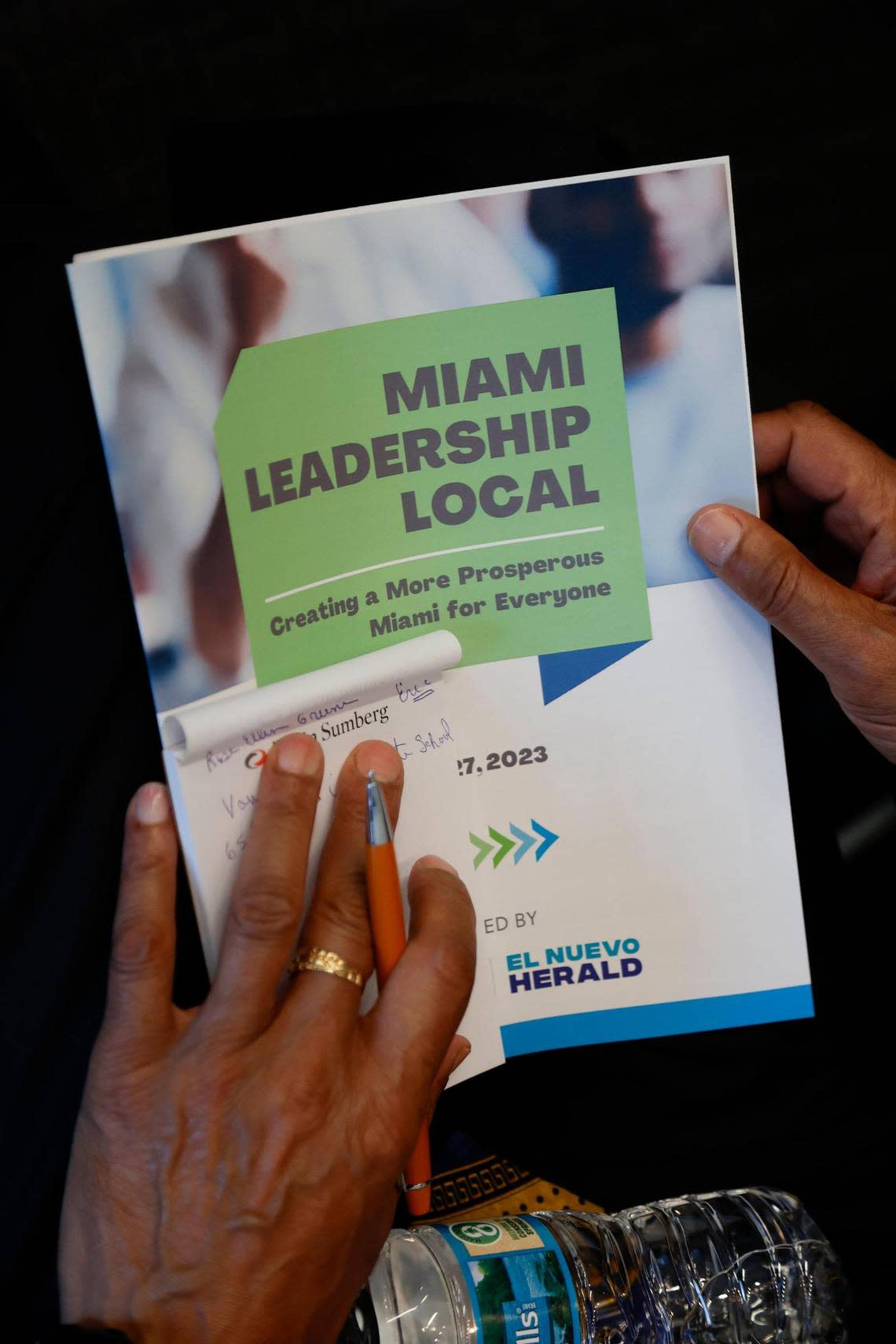
Literacy, wrap-around services essential for K-12 education
The conversation about how to best boost the city’s public education system began with the state’s newly expanded voucher program. During the 2023 Legislative session, Florida lawmakers passed one of the nation’s largest school choice programs, effectively giving every student the opportunity to obtain a taxpayer funded voucher or savings account.
The program, which went into effect this school year, enables all families to choose which school their child attends, including private schools that accept the vouchers. But data shows the program has had little impact on the district’s enrollment: Of the nearly 243,000 students statewide who obtained a voucher for the 2023-24 school year, nearly 70% were already enrolled in a private school.
In Miami-Dade, numbers mirror a similar trend.
This school year, nearly 57,000 students — an increase of nearly 13,700 students from last year — obtained a voucher. But according to the school district, the increase had no impact on enrollment and, thanks to a recent influx of immigration to South Florida, the district saw an overall increase in enrollment from last year to this year. Overall, the district has nearly 336,000 students.
The impact is “not significant,” Miami-Dade County School District Superintendent Jose Dotres told the group. But the program places the school district in a “situation where we really have to become very competitive and make sure that we provide innovative programs that respond to the needs of the students and parents in the community,” he said.
That’s where the business community comes in, he said, adding that he hopes the partnerships can help the district offer programs that are “grounded in what the future holds in terms of work and career possibilities.”
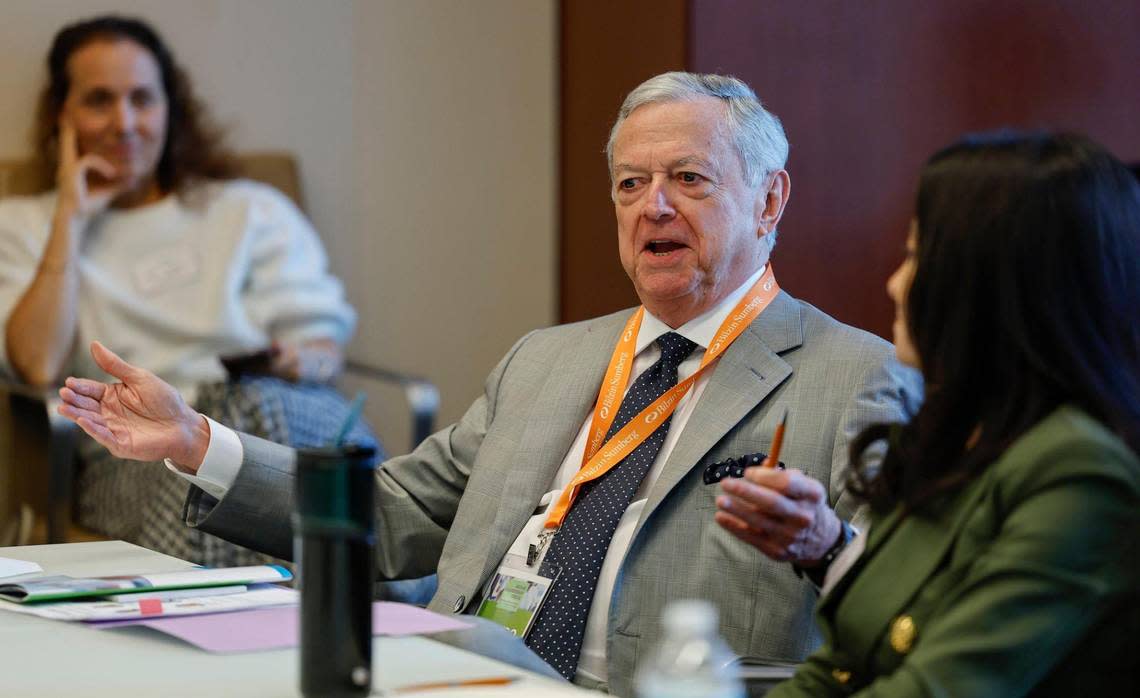
Along with Dotres, the K-12 Public Education panel session included panelists Armando Codina, founder and executive chairman of Codina Partners, a real estate investment development firm in Coral Gables, who also played a role in the development of the Downtown Doral Charter schools; Rose Ellen Greene, a philanthropist who has strong ties with KIPP Charter schools and is an active proponent of bringing more charters to the district; and Linda Lecht, president of the Education Fund, a nonprofit that is already partnered with the district to offer programming in schools.
Natalia Zea, chief public policy and engagement officer of The Children’s Trust, was the facilitator.
For her part, Lecht emphasized that “education is not a short-term project” and offered ideas for how businesses can leverage their own partnerships. (Dotres also highlighted the nonprofit’s other projects, such as the Food Forests for schools.)
“Businesses can get involved by supporting the teachers” Lecht said, highlighting a Wells Fargo-sponsored event, the Teach-A-Thon, or “a walk-a-thon” with a twist. The program gets people in classrooms to test how long they can last in the classroom.
During the discussion, attendees discussed supporting the home life of students, ensuring meals are available at schools and the importance of reading comprehension.
Overall, however, the group agreed on action steps the business community can focus on. Among them were supporting early literacy efforts, bolstering existing organizations that already provide wraparound family services, such as housing, food security and transportation, and a “systems-level change” related to the labor policies and salaries of K-12 teachers to retain quality teachers.

Lack of childcare negatively impacts workforce
It’s no surprise — at least to parents — how expensive childcare is these days, and Miami-Dade County is no exception.
In 2021, for example, childcare was the second-largest income expense for Miami-Dade families with children. At the time, the average cost of center-based care in Florida was about $8,600 — and that was two years ago. According to the US Labor Department, the average price of preschool and day care was up 6% from 2022.
Those concerns were front and center during the day’s Childcare Solutions: Benefits for Business and Parents discussion, along with how the current childcare landscape is negatively impacting families and businesses.
The panelists included Andrea Cid, CEO of Miami Growth Machine; Amanda Gorski, associate director of public policy at The Children’s Trust; and Dana Ritzcovan, EVP, chief people and outreach officer at Royal Caribbean Group. Facilitators included Kerry-Ann Royes, president and CEO of YWCA South Florida, and Melissa Pallett-Vasquez, partner at Bilzin Sumberg.
While the group of all women — it was noted no men were in attendance — discussed a range of statistics that impact families when it comes to childcare, one stood out: 75% of women single heads of households in Miami-Dade County are living less than or below a paycheck to paycheck scenario.
“That is insane,” one speaker said. “If that alone isn’t striking the conversation to say, ‘I have to put more money in their pockets somehow by shrinking this huge cost of housing and childcare.’”
The discussion often bounced naturally from one speaker to the next, with participants validating ideas and building off of one another.
One speaker mentioned a pilot project in collaboration with Miami-Dade County Public Schools to fortify the pipeline of potential employees for early childhood education. The program, according to one speaker, aims to incorporate entrepreneurial and business aspects of what it takes to run a business.
A second discussed the success of some businesses’ decision to subsidize childcare for their employees, such as Royal Caribbean’s on-site childcare facility, and how other businesses could follow a similar model. Another emphasized the need to shift away from discussing childcare as a personal, family issue to a business and community issue to help the community understand the importance of providing adequate services.
The group agreed that there has to be a tool businesses can use to understand how the lack of childcare directly impacts their output. It also agreed to push for cross-sector advocacy to develop incentives or tax credits that support the expansion of childcare and expanding income eligibility for school readiness subsidies.
But for one speaker, the message that should be emphasized is that access to childcare enables a person — and an employee — to simply show up to do their job well: “If you don’t have a piece of mind that your child is taken care of, you cannot do the rest.”
